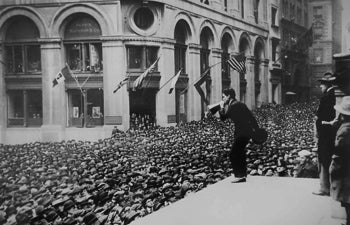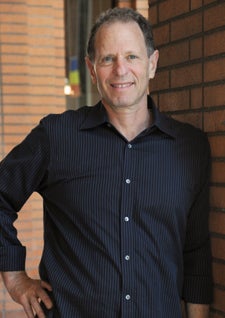Wag the Elephant
In 1972 and at the height of his career, Warren Beatty became so involved in George McGovern’s presidential campaign he turned down starring roles in Butch Cassidy and the Sundance Kid, The Sting, The Way We Were, The Great Gatsby and The Godfather.
Beatty’s obsession with the campaign led to the breakup of his longtime relationship with fiancée Julie Christie.
“Warren couldn’t stand Nixon,” George McGovern bluntly declared.
In his new book, Hollywood Left and Right: How Movie Stars Shaped American Politics (Oxford University Press, 2011), Steven Ross features Beatty, one of 10 famous personalities the professor of history in USC Dornsife uses to explain American politics throughout the 20th and 21st centuries. A key figure in McGovern’s inner circle, Beatty served as his media adviser, the first film star to hold such a position since George Murphy was entertainment director for President Dwight D. Eisenhower’s inaugurations in 1953 and 1957.
In the book, Ross selected five stars with right political views and five with left, beginning with Charlie Chaplin in 1918. Chaplin was the first to use his star appeal to promote causes, in his case the fight against Nazism.

Charlie Chaplin speaks during the Liberty Loan Rally in Washington, D.C. on April 6, 1918, urging people to buy liberty bonds to help finance World War I. Chaplin is featured in Steven Ross’ new book Hollywood Left and Right. Source: Commons.wikimedia
Ross conducted research for 10 years, reading more than 100 oral histories and interviewing dozens of people, including many of the stars featured who are still alive, such as Beatty.
In the 1920s, Louis B. Mayer was the first to bring Hollywood into the Republican Party.
Metro-Goldwyn-Mayer’s (MGM) forceful executive vice president, who campaigned for Calvin Coolidge, served in the Republican National Convention in 1928. Mayer helped secure Herbert Hoover’s presidential nomination that year, then became head of the California GOP. He turned MGM into a training ground for Republican activists, teaching Republicans how to use radio and film to sell candidates and ideas. In 1934, he introduced the first “dirty tricks” campaign with a series of staged newsreels aimed at defeating California gubernatorial hopeful Upton Sinclair.
“Working with Mayer, William Randolph Hearst printed on the front page of his newspaper a photo showing hobos rushing into California,” Ross said. “It was a still from Mayer’s 1933 film Wild Boys of the Road.”
Also, Ronald Reagan and Murphy were each elected into office in the mid-1960s and laid the groundwork for the conservative revolution of the ’80s. Murphy was a United States senator in California from 1965 to 1971. Reagan was California’s governor from 1967 to 1975 then president of the U.S. from 1981 to 1989. From 2003 to 2011, another conservative movie star, Arnold Schwarzenegger, became the “Governator” — California’s governor.
While most histories of political Hollywood focus on the Hollywood 10 and the House Un-American Activities Committee (HUAC), Ross probes deeper, exploring politics before and after the hearings. He uses Hollywood as the conduit to discuss the complex history of American politics.

Steven Ross, professor of history in USC Dornsife, received a Film Scholars Award from the Academy of Motion Picture Arts and Sciences, an academic equivalent of an Oscar, which supplied funds for him to write Hollywood Left and Right: How Movie Stars Shaped American Politics (Oxford University Press, 2011). Photo by Alexandra Bissonette.
“Sometimes the best way to get people to understand what’s going on in power politics is to express it in the form of entertainment,” said Ross, who analyzes the popularity of The Daily Show with Jon Stewart, The Colbert Report and The Glenn Beck Show in the book’s epilogue. “Everyone loves reading about movie stars and Hollywood. What I didn’t want to do is tell the same story over and over again.”
Ross conveys the history through the eyes of liberal and conservative stars who devoted much of their lives and risked their fortunes for their political beliefs.
Take Beatty for example. After the McGovern campaign failed, Beatty returned to Hollywood to influence voters through cinema. From 1974 and 1981, he made three films with political themes: The Parallax View, Shampoo and Reds. Movie buffs may remember a scene in Shampoo in which a banner hanging on a wall proclaims “Nixon’s the One” — Beatty’s way of mocking the new president and vice president Spiro Agnew.
A few years later, Beatty became one of Gary Hart’s closest advisers during Hart’s presidential bids in 1984 and 1988. Hart’s second campaign went up in flames after the National Enquirer published a photo of the married man with his mistress Donna Rice. Beatty called the scandal “sexual McCarthyism.”
During his research, Ross was surprised to find some stars emerge as sympathetic characters. Reagan, he said, was more politically savvy and sympathetic than the late Republican is sometimes perceived. In reference to HUAC, for instance, Reagan is often labeled as a friendly witness.
“Reagan wasn’t as friendly as people thought,” Ross said. “Reagan actually said to them, ‘Yes, I would like the Communist Party outlawed and I think there’s a danger, but in the meantime, you have the United States Constitution. You are asking people to purge others because of their political beliefs when the constitution guarantees the civil right to voice those beliefs.’ ”
Jane Fonda — who is still 40 years later mercilessly criticized for having her photo taken in a North Vietnamese anti-aircraft gun when she was a young activist — was another sympathetic character in the book.
“One place where it’s dangerous to speak out is on foreign policy when you’re too far in front of public opinion,” Ross said. “If we’re in a war or about to enter a war, if you speak out against the tide of public opinion the public will never forgive you. That’s what happened to Jane Fonda in Vietnam.”
In an interview Fonda told Ross, “[Posing with the Vietcong] was the biggest mistake I’ve ever made in my life and I’ve apologized. I was very naïve at the time, very naïve.”
“There’s a really strong element of misogyny in all the venom,” Ross said. “You blame a woman for a failed man’s war.”
Fonda’s negative labeling came after the tribulations of Edward G. Robinson, whose clashes with anti-Semites and anti-communists eventually derailed his A-list career. But Ross said the character most praiseworthy was Harry Belafonte.
“I admire anyone who is willing to devote 20, 30, 40 or in his case more than 50 years of his life to making America a better nation,” Ross said. “We can argue about what a better nation means. But we can’t argue with the fact that someone is willing to risk his career, willing to risk millions of dollars of earnings and spend all those years working in the trenches. Belafonte didn’t do this for publicity; he did this because he thought that’s what citizens should do.”
After meeting Dr. Martin Luther King Jr. in 1956, Belafonte worked closely with his friend and the Southern Christian Leadership Conference to promote racial equality and pressure federal and state authorities to enforce civil rights legislation. In the ’60s, he worked for anti-Vietnam war and civil rights movements and began forging alliances between black power leaders in the U.S. and Africa. After King’s assassination, Belafonte turned to global activism and shifted his political focus from the national to the international.
“If you really want a better nation you have to do more than just talk,” Ross said. “You have to put your body on the line and that’s what he did from the 1950s to today. At 84, Belafonte has not stopped.”
Ross hopes Left and Right reinvigorates democracy whatever the reader’s political leaning.
“At the very least I hope the book inspires people to participate as voters,” Ross said. “Whether it’s your mayor, your congressperson or your president — just vote.”